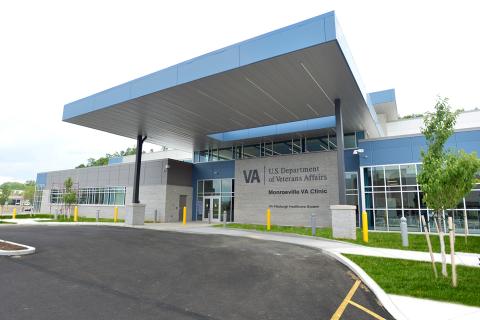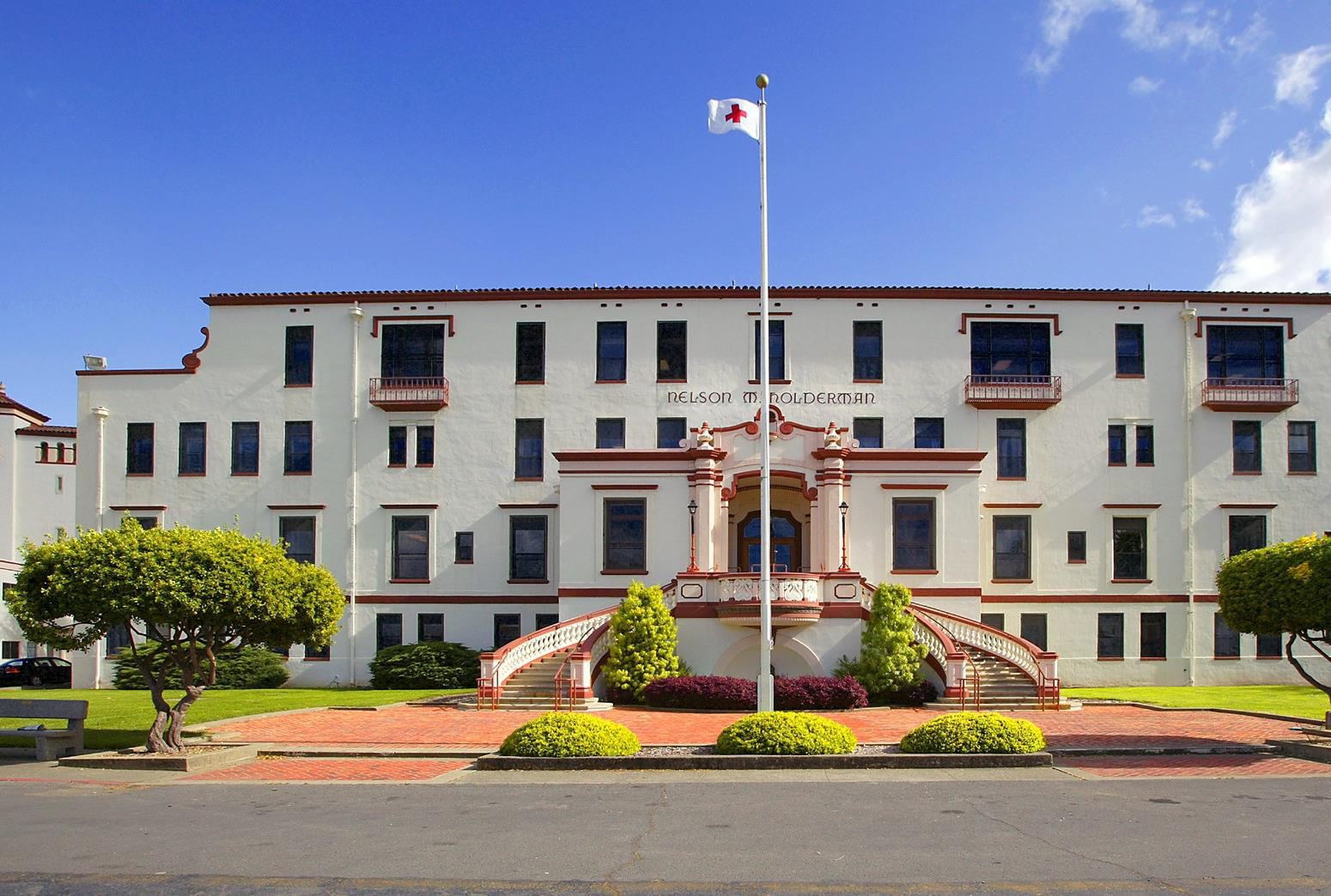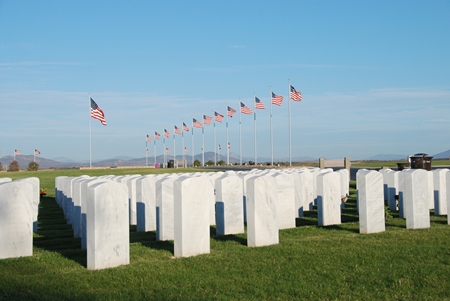Office of Construction & Facilities Management
Proposed Program Alternatives
return to Historic Preservation homeThe mission of the Department of Veterans Affairs (VA) is to serve America’s Veterans and their families by providing medical care, benefits, social support, and memorials. As the second largest Federal Department, this mission is accomplished through a network of service facilities administered by the Veterans Health Administration (VHA), the Veterans Benefits Administration (VBA), and the National Cemetery Administration (NCA). The VA Historic Preservation Office (HPO) is responsible for the agency’s compliance with the National Historic Preservation Act*.
Section 106* of the National Historic Preservation Act requires federal agencies to consider the effects of their projects on historic properties and to provide the Advisory Council on Historic Preservation* (ACHP), the independent federal agency that advises the President and Congress on national preservation policy, the opportunity to comment on those undertakings. Under Section 106, federal agencies may develop alternatives to the standard process, when needed, to best balance the federal agency mission with historic preservation concerns.
VA proposes to develop and implement three program alternatives. VA is proposing Nationwide Programmatic Agreements* (NPAs) to address Section 106 processes for two of the agency’s most active programs - the State Home Construction Grant Program and the Leasing Program of the VA Office of Real Property. VA is consulting with the ACHP, federally recognized Tribes, Native Hawaiian organizations, the National Conference of State Historic Preservation Officers (NCSHPO), the National Association of Tribal Historic Preservation Officers (NATHPO), and consulting parties as part of the respective NPA development processes. VA also is pursuing a Standard Treatment to set a national standard for the assessment of adverse effects to National Cemeteries. Consultation pursuant to this proposal is ongoing.
NPA for Leasing Program

VA leases space from private and federal entities, including the General Services Administration (GSA), and uses leased space to fulfill its mission by acquiring office space for administrative and benefits staff, as well as rehabilitating, renovating, and constructing medical facilities for Veteran services. VA has projected a nearly 50% increase in the national demand for outpatient services by FY 2029, but in different geographies than past Veteran generations. VA expects to increasingly use leasing actions to meet the need of this newly expanded Veteran population and to implement advances in clinical care and technology.
A tailored Section 106 approach for VA’s Leasing Program would provide a structured process to facilitate expedited construction schedules and align the Section 106 process with other federal compliance requirements, as well as provide consistency with the agency’s modernization plans. VA is proposing an NPA because the agency is seeking a simplified process to the traditional identification of historic properties and assessment of adverse effects.
In October 2024, VA hosted consultation meetings to provide background on VA’s Leasing Program and the opportunity to discuss the proposed NPA. VA accepted comments prior to and after these meetings.
VA released the draft Leasing NPA for review in December 2024 and requested comments by January 31, 2025. The comment period for the draft Leasing NPA is closed. VA considered all comments in the revised draft NPA.
VA released the revised draft Leasing NPA and attachments A, C, and D in June 2025. Comments received on the first draft and VA's consideration of said comments are included in the comment matrix. Comments on the revised draft may be submitted via email at historicpreservation@va.gov. VA requests submittal of comments on the revised draft by July 7, 2025 and comments on the attachments by July 18, 2025; email subject lines should reference "Leasing Program NPA."
Submitted comments will be shared and may be subject to disclosure under the Freedom of Information Act. Do not share confidential, personal, and/or sensitive data you would not want to disclose.
Consultation Meeting Schedule Overview
VA hosted two rounds/six consultation meetings with interested parties:Round 1 Meetings
- October 1, 2024 (2:30pm EST) - NCSHPO, SHPOs [Presentation] [Notes]
- October 2, 2024 (2:30pm EST) - federally-recognized Indian Tribes, NHOs, Alaska Native Corporations, NATHPO [Presentation] [Notes]
- October 7, 2024 (3:00pm EST) - any interested party, including the NTHP, CLGs, and VSOs [Presentation] [Notes]
- June 16, 2025 (2:30pm EST) - NCSHPO, SHPOs [Presentation] [Notes]
- June 17, 2025 (2:30pm EST) - federally-recognized Indian Tribes, NHOs, Alaska Native Corporations, NATHPO [Presentation] [Notes]
- June 18, 2025 (2:30pm EST) - any interested party, including the NTHP, CLGs, and VSOs [Presentation] [Notes]
NPA for State Home Construction Grant Program

The State Home Construction Grant Program (SHCGP) is a partnership between VA and state veterans affairs agencies to construct, renovate, or upgrade state-owned and operated nursing homes, domiciliaries, and adult day health care facilities (State Veterans Homes [SVHs]). VA does not operate these facilities but grants fund necessary improvements. After a review of the Section 106 compliance efforts during the COVID-19 emergency, VA is seeking a process for addressing emergencies when the agency is a grantor of funds. The procedures would be helpful in responding to natural disasters as well. In addition, an NPA would provide grant applicants guidance to develop plans consistent with historic preservation practices.
The intent of the SHCGP NPA would be to delineate clear roles for VA and applicants in the Section 106 process; through consultation, establish a list of programmatic allowances with limited or no potential to adversely affect historic properties that can be applied during a standard Section 106 process and in times of emergency; and define “standard” and “emergency” processes for Section 106 compliance, including response times.
VA hosted consultation meetings in October 2024 to provide background on VA’s Grant Program and the opportunity to discuss the proposed NPA. VA accepted comments prior to and after these meetings.
VA will host a second round of consultation meetings to discuss the proposed SHCGP NPA in February 2025. VA requests that interested parties send an email to HistoricPreservation@va.gov to receive information about the February meetings.
- October 15, 2024 (2:30pm EST) - NCSHPO, SHPOs[Presentation][Notes]
- October 16, 2024 (2:30pm EST) - federally-recognized Indian Tribes, NHOs, Alaska Native Corporations, NATHPO [Presentation] [Notes]
- October 21, 2024 (2:30pm EST) - Any interested parties including NASVH, NTHP, CLGs, VSOs, and/or members of the public [Presentation] [Notes]
VA will host a number of consultation meetings via webinar on the proposed NPA to provide background on VA’s Grant Program and the opportunity to discuss the proposed NPA. VA requests that participants register in advance for meetings at historicpreservation@va.gov.
Comments on the proposed State Home Construction Grant Program NPA may be submitted via email at HistoricPreservation@va.gov. VA requests that email subject lines reference “State Home NPA.” Submitted comments will be shared and may be subject to disclosure under the Freedom of Information Act. Do not share confidential, personal, and/or sensitive data you would not want to disclose.
Standard Treatment for Assessment of Effects to National Cemeteries

In 2011, the Keeper of the National Register of Historic Places* issued a policy* confirming that all National Cemeteries “are eligible [for listing in the National Register] because they have been designated by Congress as primary memorials to the military history of the United States.” The 2011 Policy states that all National Cemeteries, regardless of age, are eligible for the National Register, and that all resources within these cemeteries – regardless of age or function – contribute to the significance of these historic properties. Though VA has found this guidance useful in developing National Register nominations for National Cemeteries, the agency has encountered challenges with its interpretation during Section 106 reviews.
In March 2024, VA requested guidance from the ACHP concerning application of the 2011 Policy when assessing adverse effects to historic properties. As a result of this request, VA and the ACHP are exploring drafting a Standard Treatment, a type of Program Alternative that establishes standardized practices for addressing certain categories under Section 106. A Standard Treatment would serve as a companion piece to the 2011 Policy Memo, clarifying the assessment of adverse effects for National Cemeteries as a category of historic properties. The other federal agencies responsible for management and operation of National Cemeteries – the U.S. Army* and the National Park Service* – would not be obligated to follow the Standard Treatment but could elect to do so if they believe it will be of benefit in meeting their Section 106 compliance requirements.
VA sought input from the public via a widely disseminated questionnaire soliciting ideas about the significance of our National Cemeteries and their component parts during a public comment period that lasted from December 17, 2024 through February 17, 2025. The questionnaire was designed to inform VA's historic preservation efforts as it relates to future operations, maintenance, and expansion activities in our National Cemeteries. The survey was not unique to one National Cemetery or project and did not include any information about planned or funded initiatives for specific National Cemeteries. VA is using the data collected during this public comment period to inform its forthcoming formal request to the ACHP for a Standard Treatment for National Cemeteries.
Standard Treatments are issued by the Executive Director of the ACHP, and consultation is under their jurisdiction. Please contact ACHP’s VA Liaison, Vanessa Hanvey, at vhanvey@achp.gov to learn about the process for submitting comments related to the Standard Treatment. Submitted comments will be shared and may be subject to disclosure under the Freedom of Information Act. Do not share confidential, personal, and/or sensitive data you would not want to disclose.
Document List
Select a Document to Review or Comment:
- Request for National Cemeteries Program Alternative (2024)
- National Cemeteries Database (2024)
- Clarification of Policy for NR Eligibility of National Cemeteries (2011)
- Request for Leasing Program Program Alternative (2024)
- Request for VA State Home Grants Program Alternative
- Leasing Program Consultation Plan
- SVHP Consultation Plan
















